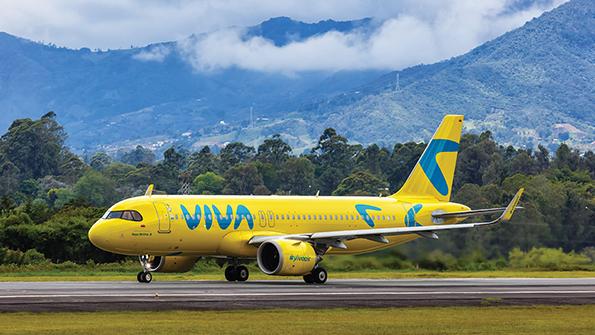
The once-promising ULCC’s future is in doubt now that it has suspended operations.
Roughly two months shy of its 11th anniversary, South America’s first ultra-low-cost carrier, Viva, has shuttered operations in a strange turn of events for an airline that was positioning itself to compete fiercely in the post-pandemic marketplace.
Viva launched operations in May 2012 and gradually became Colombia’s third-largest airline as measured by passengers carried. The country’s first- and second-largest operators are flag carrier Avianca and LATAM Airlines Colombia, respectively.
- The country’s government has been slow to approve a merger with Avianca
- The airline’s fate shows Colombia’s growth came at a price
During the depths of the COVID-19 pandemic, while Avianca was formally restructuring under Chapter 11 bankruptcy protection, Viva renegotiated more than 1,000 contracts ranging from smaller vendors to aircraft lessors. As a result, its unit costs fell roughly 10% below pre-crisis levels.
But as 2022 unfolded, a spike in jet fuel prices, a devaluation in the Colombian peso and other challenges created headwinds for Viva. In April 2022, Avianca announced plans to acquire its smaller rival, and both stressed that their respective brands and business strategies would remain intact.
In August, Avianca and Viva asked Colombia’s regulators for expedited approval of the transaction due to Viva’s delicate financial situation. Aerocivil rejected the deal in November, and the two airlines subsequently offered concessions to gain approval for the transaction, including the relinquishment of 105 slots at Bogota El Dorado International Airport.
In January, Aerocivil decided to reexamine the transaction after it found a substantial irregularity in its initial review. After Colombian regulators stated their intent to review the Avianca-Viva transaction a second time, two other companies expressed interest in acquiring Viva—South American ultra-low-cost carrier (ULCC) JetSmart and LATAM Airlines Colombia.
Avianca and Castlesouth Ltd., which holds voting rights in Viva, became increasingly frustrated and vocal over what they deemed Aerocivil’s foot-dragging in approving the transaction. The two companies asserted that Viva was at a critical point and that an integration with Avianca was in the best interest of Viva’s passengers, creditors and employees.
In February, Viva entered into a voluntary 90-day reorganization, explaining that it had been unable to access capital during the previous nine months due to the delay in gaining approval for the Avianca transaction.
On Feb. 27, Viva suspended operations, citing delays in Aerocivil’s approval as the main reason. Avianca said one-third of Viva’s fleet “has been lost.” At the start of the year, Viva operated a fleet of 21 Airbus A320ceos and A320neos, all of which were leased. Viva said its aircraft lessors had met with Colombia’s government to explain that they would not continue to wait for a decision regarding the Avianca transaction, which led to the fleet losses.
The dizzying series of events begs the question of how a promising airline in a fast-growing market could have met such an uncertain fate. Aerocivil’s data shows that 48 million passengers traveled by air in Colombia last year, compared with roughly 39 million in 2019, a contrast with many aviation markets worldwide that have not returned to pre-pandemic passenger levels.
But that growth came at a price. Carlos Ozores, vice president and managing director for aviation at consultancy ICF, tells Aviation Week that while Viva was growing significantly from a traffic perspective, the airline forced a fare war in the domestic market and “created the situation whereby all of the actors on domestic trunk routes were losing money.”
Ozores notes that while Colombia is regularly identified as a dynamic market, “[if] you bring down the fares, you’ll get more and more people traveling, but each incremental passenger is not a profitable passenger.”
Viva said that while its operations are grounded it will continue to pursue negotiations with its creditors and work to preserve its ability to restart operations eventually—“assuming Aerocivil promptly approves the pending transaction,” the airline added.
But the probability of Viva restarting its operations is dimming, as lessors may see more profitable opportunities elsewhere, given the supply chain challenges constraining aircraft deliveries.
Aerocivil, meanwhile, has issued a statement that third parties can weigh in on the Avianca-Viva deal. The remedies offered by Avianca and Viva “will be transferred in a timely and transparent manner to interested third parties in the action, who may express their opinions,” the agency said.
Avianca has dismissed the interest in Viva expressed by other airline groups as unfeasible and late and says they are a distraction from “the request for integration of Avianca and Viva.”
Prior to its interest in acquiring Viva, JetSmart was working to establish a subsidiary in Colombia, but it has not gained approval to launch operations there. The airline has operations in Argentina, Chile and Peru, and Ozores says Colombia is a natural growth market for the company.
He notes that JetSmart, which is majority-owned by Indigo Partners, is working to build a Pan-South American operation, and that ambition, coupled with Indigo’s holdings in ULCCs Volaris in Mexico and Frontier Airlines in the U.S., “makes so much sense—the only way for this [ULCC] model to work is to keep growing.”
Unfortunately for Viva, its growth prospects are narrowing by the day in an ironic twist for the first true ultra-low-cost airline to plant roots on the South American continent.
